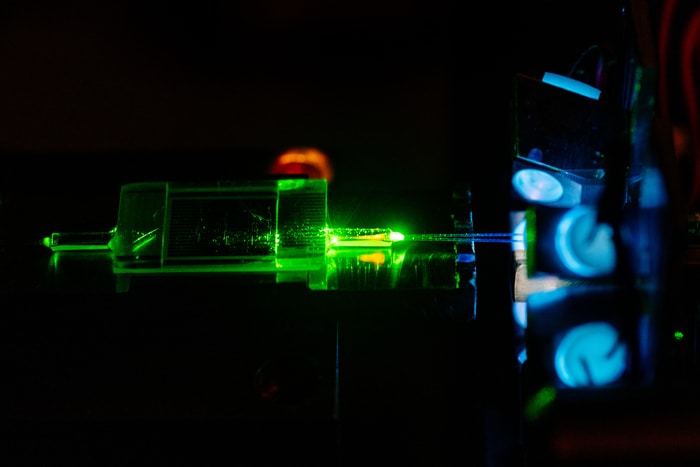With its 2020 frame building, the NRW Ministry of Culture and Science (MKW) in Germany is creating scope for developing forward-looking research topics and sustainably boosting the competitiveness of the institutions involved. Around a million euros in annual funding are being provided per project. Building on available strengths, potential areas will be expanded to help further develop the research profile. Paderborn University has now been successful with an application for the photonic quantum supercomputing potential area. Within this, scientists are taking an interdisciplinary approach to creating a photonic quantum supercomputer. In the future, every step will take place at a single site, from fundamental research into new quantum algorithms to modeling large, complex quantum systems to implementing photonic quantum networks for relevant supercomputing applications. The project also seeks to train a new generation of outstanding researchers in the field of quantum supercomputing, with gender equality as an ongoing concern. This profile area should establish Paderborn as an internationally visible center for photonic quantum technologies. 
From fundamentals to practical application
The composition and utilization of the “second quantum revolution” is one of the challenges of this digital century. Quantum supercomputing in particular, with its previously unattainable computing power, will inevitably result in fundamental changes to technology and society, project manager Prof. Christine Silberhorn explains. However, in Silberhorn’s view, application-specific quantum supercomputers are still some distance away. Key questions remain open and solutions are often only just beginning to emerge. This is something that scientists are seeking to change: the core of this large-scale project is the parallel, coordinated development of quantum photonic, quantum-information-theory, and mathematical-algorithmic models and technologies that tap the full potential of photonic quantum supercomputers. In terms of prospects, this should result in at least one leading national and international research center in the field of photonic quantum supercomputing. Silberhorn notes: "Firstly, the pressing scientific questions are linked to the scalability aspect of photonic quantum systems, and secondly, algorithmic foundations and practicable applications must be explored using photonic quantum systems."
This speaks for itself: the applications are hugely complex and must, for example, be robust in the face of data loss and environmental influences. "This requires the development of highly integrated systems. Whilst the applications and information-theory technologies of quantum communications are already well understood, this is not the case for quantum computing," Silberhorn continues. Given this, interdisciplinary, transdisciplinary, and international collaborations need to be established that can take a targeted approach to tackle research obstacles that a single discipline would be unable to overcome. In Silberhorn’s view, for the first time ever this will enable the provision of flexible, integrated optical systems for quantum supercomputing that were previously impossible.
Pooling core competencies in Paderborn
The initiative includes scientists from the Faculty of Computer Science, Engineering, and Mathematics and the Faculty of Science, primarily within the Department of Physics, the Department of Electrical Engineering and Information Technology, and the fields of pure and applied mathematics. The targeted combination of various different core competencies will enable the systematic development of the research field of photonic quantum computing and the creation of new synergies that go far beyond the capacities of the individual disciplines. This establishment of new structures to transfer the topic from fundamental physics research into engineering research activities is virtually unique in the German research landscape. Prof. Birgitt Riegraf is very proud of this: "Pooling various different disciplines produce concentrated agglomerations of research strengths based on the exceptional skill and years of experience offered by outstanding researchers. This success, making Paderborn’s research even more visible on an international stage, is fantastic."
Training highly skilled researchers
Another primary element is training researchers in all aspects of quantum technologies with quantum supercomputing as the core focus. To this end, an interdisciplinary graduate college is to be established that can train a new generation of researchers. Silberhorn: ‘This is an opportunity for us to establish ourselves as the first designated location for quantum photonics engineers, taking particular care to ensure equal opportunities for both male and female researchers in Germany.’ Another goal will also be to establish an interdisciplinary master’s program in Quantum SuperComputing.
Interdisciplinary center for quantum photonics
Critical technologies underlying the development of a photonic quantum supercomputer are already being gradually established in Paderborn. With the funding approved last year for the Photonic Quantum Systems Laboratory (PhoQS Lab) research building, suitable infrastructure has been created to research ground-breaking quantum circuits for quantum photonics applications. Together with the foundation of the Institute for Photonic Quantum Systems (PhoQS), therefore, a unique interdisciplinary center for quantum photonics is in development.
Ten-year plan
Over the next three to five years, the foundations will be laid for developing photonic quantum supercomputing into a practicable hardware platform and a key cornerstone of high-performance supercomputing (HPC). Over the subsequent five to seven years, work will be undertaken to expand the scalability of the relevant systems, integrate quantum computing into traditional computing platforms and HPC systems in particular, and significantly augment algorithmic technologies for photonic quantum computing. Things will be kicking off in November. During the first five years, new application fields will be opened up for non-universal quantum supercomputers, and scalable, integrated optical quantum circuits will be developed that are ideally tailored to the challenges of quantum supercomputing. The foundations will also be laid for the interdisciplinary training of quantum supercomputing specialists in Paderborn.


 How to resolve AdBlock issue?
How to resolve AdBlock issue?